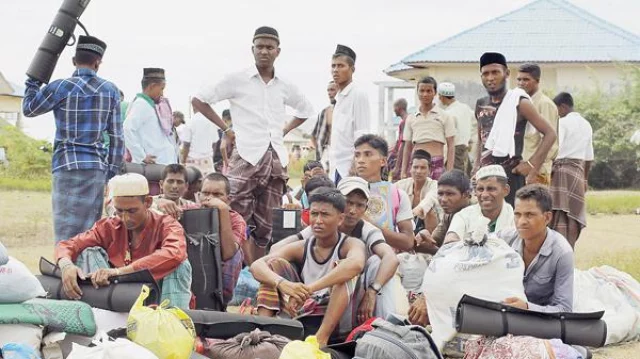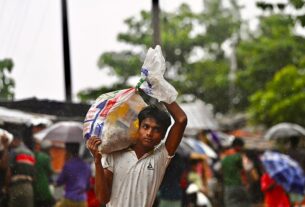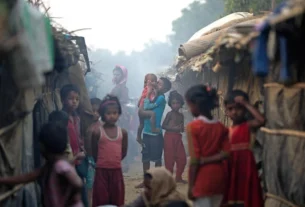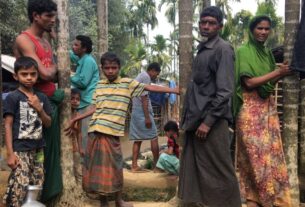According to local sources, the Arakan Army (AA) summoned Rohingya village administrators in Maungdaw Township, Rakhine State, to a meeting on October 20 and ordered that each household must send one person for compulsory military service.
The meeting was reportedly held in the old village of Hla Phoe Khaung in northern Maungdaw, where senior AA/ULA officials told Rohingya administrators that every ethnic group has a duty to participate in the struggle for Rakhine’s liberation. They instructed larger villages to send at least 200 men and smaller villages to send about 150 men each for the first round of recruitment.
Men aged 18 to 45 are required to serve, while women aged 18 to 35 must attend a minimum of 45 days of military training. If a household has no male member, one woman must be sent instead, and those unable to comply must pay a monetary sum, the locals said.
After completing the military training, recruits are reportedly being sent directly to the frontlines, causing deep concern among families. Locals expressed fear over being forced into training and conscription against their will.
The AA’s orders amount to coercion and unlawful pressure on the Rohingya population, residents said, adding that some Rohingya in Maungdaw have begun attempting to flee to Bangladesh to escape the forced conscription.
The Arakan Army’s conscription orders imposed on the Rohingya community constitute a clear violation of international humanitarian and human rights law. These acts may amount to forced labor, conscription of civilians by a non-state armed group, and potentially war crimes under international law.
1. Violation of the Geneva Conventions (Common Article 3)
Common Article 3 of the 1949 Geneva Conventions—which applies to non-international armed conflicts—strictly prohibits:
-
“Violence to life and person, in particular murder of all kinds, mutilation, cruel treatment and torture;” and
-
“Outrages upon personal dignity, in particular humiliating and degrading treatment.”
Forcing civilians—especially members of an ethnic and religious minority—to serve in armed forces or undergo military training constitutes cruel and inhumane treatment under this article.
2. Breach of the Rome Statute of the International Criminal Court (Article 8)
Under Article 8(2)(b)(xvii) and 8(2)(b)(xxiii) of the Rome Statute, the following acts are defined as war crimes:
-
“Compelling the nationals of a hostile party to take part in the operations of war directed against their own country or forces.”
-
“Utilizing the presence of a civilian or other protected person to render certain points, areas, or military forces immune from military operations.”
Forcing Rohingya civilians into military service by a non-state armed group such as the Arakan Army—especially in active conflict zones—fits this definition.
3. Violation of the International Covenant on Civil and Political Rights (ICCPR)
Article 8(3)(a) of the ICCPR prohibits “forced or compulsory labour.”
Even though Myanmar is not a party to the ICCPR, the prohibition on forced labor has attained customary international law status and binds all actors, including non-state armed groups.
4. Breach of ILO Convention No. 29 on Forced Labour
Under the International Labour Organization’s Convention No. 29 (1930), Article 2(1) defines forced labor as:
“All work or service which is exacted from any person under the menace of any penalty and for which the said person has not offered himself voluntarily.”
The AA’s coercive conscription drive—threatening fines, punishment, or retaliation for refusal—clearly falls within this definition.
5. Possible Violation of the Convention on the Rights of the Child (CRC)
If any persons under 18 are recruited or trained, this would violate Article 38(3) of the Convention on the Rights of the Child, which obliges all parties to ensure that:
“Children under the age of fifteen years do not take a direct part in hostilities.”




